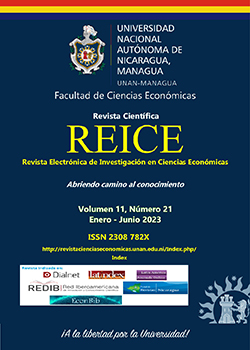Accounting as a basis for information support of enterprise taxation
DOI:
https://doi.org/10.5377/reice.v11i21.16548Keywords:
accounting, tax accounting, tax information, indicators of financial and economic activity, information technologies, preparation of analytical reportsAbstract
The experience of modern business theory and practice proves that an effective organization of accounting at an enterprise nowadays is impossible without applying information technologies and their effective use, which is becoming increasingly important in the process of optimizing companies’ taxation. The purpose of the academic paper is to highlight modern tendencies in the development of accounting as an important informational component of business entities’ taxation. Methodology. In the course of the research, analytical and bibliographic methods were used to study the scientific literature on developing accounting in terms of its purpose for the taxation of business entities. At the same time, induction, deduction, analysis, synthesis of information, system-structural, comparative, logical-linguistic methods, abstraction, and idealization were applied to study and process data. By the way, the research authors also conducted a questionnaire in online mode to practically clarify the most significant issues related to accounting and tax accounting at the enterprise. Results. Based on the research results, the main and most important theoretical aspects of issues related to accounting were established from the perspective of its role in the information provision of tax accounting at the enterprise. Along with this, the standpoints of scientists and accountants
Downloads
325
References
Akcigit, U., Grisby, J., Nicholas, T., & Stantcheva, S. (2022), Taxation and innovation in the twentieth century.The Quarterly Journal of Economics, 137, 1, 329–385, https://academic.oup.com/qje/article-abstract/137/1/329/6292271. https://doi.org/10.1093/qje/qjab022.
Andrews, I., & Kasy, M. (2019). Identification of and correction for publication bias. American Economic Review, 109, 8, 2766–94. https://www.aeaweb.org/articles?id=10.1257/aer.20180310. https://doi.org/10.1257/aer.20180310.
Balima, H. W., Kilama, E. G., & Tapsoba, R. (2020). Inflation targeting: Genuine effects or publication selection bias? European Economic Review, 128, 4–5, Article 103520. https://www.sciencedirect.com/science/article/abs/pii/S0014292120301513. https://doi.org/10.1016/j.euroecorev.2020.103520.
Bom, P. R. D., & Rachinger, H. (2019). A kinked meta–regression model for publication bias correction. Research Synthesis Methods, 10, 4, 497–514. https://onlinelibrary.wiley.com/doi/10.1002/jrsm.1352. https://doi.org/10.1002/jrsm.1352.
Fabian, K., & Milionis, P. (2019). Is capital taxation always harmful for economic growth? International Tax and Public Finance, 26, 4, 758–805. https://link.springer.com/article/10.1007/s10797-019-09530-3.
Ferraro, D., Ghazi, S., & Peretto, P. F. (2020). Implications of tax policy for innovation and aggregate productivity growth. European Economic Review, 130. Article 103590. https://www.sciencedirect.com/science/article/abs/pii/S0014292120302208. https://doi.org/10.1016/j.euroecorev.2020.103590.
Gechert, S., & Heimberger, P. (2022). Do corporate tax cuts boost economic growth? European Economic Review, 147, 104157. https://www.sciencedirect.com/science/article/pii/S0014292122000885. https://doi.org/10.1016/j.euroecorev.2022.104157.
Gechert, S., & Rannenberg, A. (2018). Which fiscal multipliers are regime-dependent? A meta-regression analysis. Journal of Economic Surveys, 32, 4, 1160–1182. https://onlinelibrary.wiley.com/doi/10.1111/joes.12241. https://doi.org/10.1111/joes.12241.
Gechert, S. (2022). Reconsidering macroeconomic policy prescriptions with meta-analysis. Industrial and Corporate Change, 31, 2, April 2022, 576–590, https://academic.oup.com/icc/article-abstract/31/2/576/6540490?redirectedFrom=fulltext. https://doi.org/10.1093/icc/dtac005.
Havránek, T., Stanley, T. D., Doucouliagos, H., Bom, P. R., Geyer-Klingeberg, J., Iwasaki, I., Reed, W. R., Rost, K., & Aert, R. C. M. (2020). Reporting guidelines for meta-analysis in economics. Journal of Economic Surveys, 34, 3, 469-475. https://onlinelibrary.wiley.com/doi/10.1111/joes.12363. https://doi.org/10.1111/joes.12363.
He, L., Mu, L., Jean, J. A., Zhang, L., Wu, H., Zhou, T., & Bu, H. (2022). Contributions and Challenges of Public Health Social Work Practice during the Initial 2020 COVID-19 Outbreak in China. The British Journal of Social Work, 52, 8, December 2022, 4606–4621. https://academic.oup.com/bjsw/article-abstract/52/8/4606/6573364?redirectedFrom=fulltext&login=false. https://doi.org/10.1093/bjsw/bcac077.
Heimberger, P. (2020). Does economic globalisation affect income inequality? A meta–analysis. Еру World Economy, 43, 11, 2960–2982. https://onlinelibrary.wiley.com/doi/10.1111/twec.13007. https://doi.org/10.1111/twec.13007.
Hope, D., & Limberg, J. (2022). The economic consequences of major tax cuts for the rich. Socio-Economic Review, 20, 2, 539–559. https://academic.oup.com/ser/article/20/2/539/6500315. https://doi.org/10.1093/ser/mwab061.
Juga, J., Juntunen, J., & Paananen, M. (2018). Impact of value-adding services on quality, loyalty and brand equity in the brewing industry, International Journal of Quality and Service Sciences, 10, 1, 61–71. https://doi.org/10.1108/IJQSS-10-2016-0071. https://www.emerald.com/insight/content/doi/10.1108/IJQSS-10-2016-0071/full/html.
Kroon, N., Do Céu Alves, M., & Martins, I. (2021). The impacts of emerging technologies on accountants’ role and skills. Connecting to open innovation: A systematic literature review. Journal of Open Innovation: Technological, Marketing and Complexity, 7, 163. https://www.mdpi.com/2199-8531/7/3/163. https://doi.org/10.3390/joitmc7030163.
Neisser, C. (2021). The elasticity of taxable income: A meta-regression analysis. The Economic Journal, 131, 640, 3365–3391. https://academic.oup.com/ej/article-abstract/131/640/3365/6263638?redirectedFrom=fulltext. https://doi.org/10.1093/ej/ueab038.
Shevlin, T., Shivakumar, L., & Urcan, O. (2019). Macroeconomic effects of corporate tax policy. Journal of Accounting and Economics, 68, 1. Article 101233. https://www.sciencedirect.com/science/article/pii/S0165410119300205. https://doi.org/10.1016/j.jacceco.2019.03.004.
Steinmüller, E., Thunecke, G. U., & Wamser, G. (2019). Corporate income taxes around the world: a survey on forward-looking tax measures and two applications. International Tax and Public Finance, 26, 2, 418–456. https://link.springer.com/article/10.1007/s10797-018-9511-6.
Suzuki, K. (2022). Corporate tax cuts in a Schumpeterian growth model with an endogenous market structure. Journal of Public Economic Theory, 24,2, 324–347. https://onlinelibrary.wiley.com/doi/10.1111/jpet.12545. https://doi.org/10.1111/jpet.12545.
Wen, L., Yu, Y., & Chen, S. (2020). Tax policies will help win the battle against COVID-19 [J]. China State Finance, 08, 69–70. https://kns.cnki.net/kcms/detail/detail.aspx?doi=10.14115/j.cnki.zgcz.2020.08.028
Zigraiova, D., Havránek, T., Irsova, Z., & Novak, J. (2021). How puzzling is the forward premium puzzle? A meta-analysis. European Economic Review, 134, 5, Article 103714. https://www.sciencedirect.com/science/article/abs/pii/S0014292121000672. https://doi.org/10.1016/j.euroecorev.2021.103714.
Downloads
Published
How to Cite
Issue
Section
License
Copyright (c) 2023 Revista Electrónica de Investigación en Ciencias Económicas

This work is licensed under a Creative Commons Attribution-NonCommercial-ShareAlike 4.0 International License.
Copyright (c) Revista Electronica de Investigacion en Ciencias Economicas
The rights to the articles published in REICE are from the journal, in order to be able to manage their best dissemination. However, since the purpose of the same is the dissemination of knowledge, this journal provides immediate free access to its content, under the principle that making research available to the public free of charge, which fosters a greater exchange of global knowledge.
The opinions expressed by the authors do not necessarily reflect the position of the publisher of the publication or of the UNAN-Managua. Its reproduction and distribution is authorized (in any type of support) provided that the following indications are fulfilled:
- The authorship of the work
- Indicate its origin (REICE magazine, volume, number and electronic address of the document)

